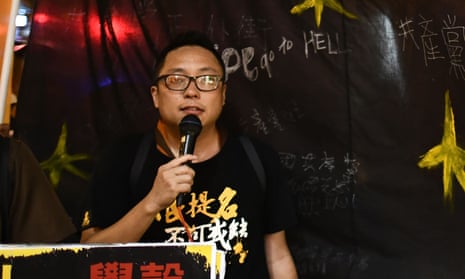A Hong Kong court has sentenced a former radio DJ and political party official charged with “seditious” verbal crimes to 40 months in jail.
Tam Tak-chi, also known by his radio name Fast Beat, was also fined $5,000 after he was found guilty on 11 of 14 charges against him last month, including seven counts of “uttering seditious words”. He was acquitted of two counts of “disorderly conduct in a public place,” and one of “conspiracy to utter seditious words.”
Tam was the first person to be charged with sedition in Hong Kong since 1997, under a colonial-era law that authorities in the territory have used with increasing frequency since the crackdown began on pro-democracy protesters and supporters. The anti-sedition law is separate to the national security law introduced in 2019 which also criminalises acts as sedition, as well as terrorism, secession, and foreign collusion.
The 50-year-old former vice-chair of the People Power party has been in jail since his September 2020 arrest. He had been arrested on a similar accusation in the January prior and released on bail.
Prosecutors alleged that the activist used anti-police slogans as well as phrases commonly heard at the 2019 protests: “liberate Hong Kong, revolution of our times” and “five demands, not one less” on multiple occasions. His trial saw the prosecution and defence debate the meaning of “liberate” and “revolution” throughout Chinese history.
In a separate trial of the first person charged under the national security law, the court ruled the “liberate” phrase could be used to incite others to commit secessionist activities.
Stanley Chan, the national security judge picked by Hong Kong’s government, sentenced Tam to a total of 54 months for the various charges, including two years for “incitement to knowingly take part in an unauthorised assembly”, but ruled several be served concurrently, reducing the total imprisonment to 40 months.
Chan said he found no mitigating factors, and accused Tam of “grandstanding” and having a “subjective wish” to stand for and win the then-planned legislative election. Tam is among 47 campaigners, activists and politicians who were arrested and detained over a pre-election primary. The democratic caucus later resigned in protest, and the electoral system was overhauled to largely make it impossible for opposition camps to win.
Maya Wang, Human Rights Watch’s senior China researcher, said Tam’s sentence “exemplifies the dizzying speed at which Hong Kong’s freedoms are being eroded”.
“Once known as Asia’s protest capital, Hong Kong is now sentencing people to years in prison simply for shouting slogans.”
